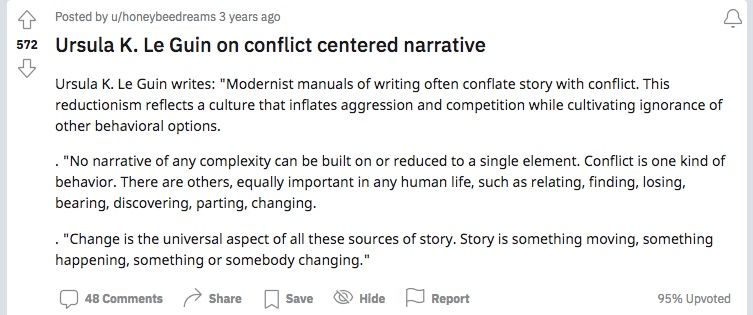plot/not plot (on plotting 3)

I think I obsess about plot because I came to it so late, as I described in my first post. I have a novice's fear of it, especially writing in a genre that so often links good plot with good story; yet if you ask me to define what a story is fundamentally about, I would say not conflict but change, much as Le Guin describes in the screengrab above. (I actually have this quote highlighted in my own copy of Steering the Craft; the fact that I'd forgotten it says something about how I relate to ebooks versus print.)
There is also the excellent Max Gladstone's take on the whole conflict/no conflict thing, which he went into in a recent newsletter that you can read here, while also referencing another newsletter from last year on the topic. I am still circling around this phrase:
Claiming that all stories need conflict, to me, feels like telling someone to punch the target, rather than to punch through.
But he also centers story around tension, rather than change:
I like ‘tension’ as an organizing concept over ‘conflict’ because it releases characters from the mystery-play burden they otherwise face, of being eidolons for abstract concepts. Pride and Prejudice isn’t about all Pride, summed up in the person of Mr Darcy, set against all Prejudice, summed up in the person of Elizabeth Bennett.
And in the more recent newsletter:
A given character tends to operate in tension between, say, individual and society, much more often than they operate as party to one side or another of a conflict between them. A person may feel bound by society—a society of which they, themselves, are a part, and which is a part of them. The circumstances of the story provide pressure, and the choices a character makes under pressure, disclose their nature, and the nature of the tension they experience, and how they, personally, resolve it, under a particular set of circumstances. It’s a subtle distinction, I’ll grant, but it makes all the difference.
And that was where I ... oh, is struggled the right word? Perhaps. I understood what he meant—I can see it clearly, and I too find it a far more useful lens—but I had this gut-level resistance to it that, with a week of mulling, I think is actually fear.
Because conflict, I think, has become my crutch.
In this series I've fallen into a distinct narrative rhythm of building up to a violent set piece every so many chapters, as if this is the only kind of turning point or tentpole at my disposal. And part if it is because, fuck yeah fight scenes! And part of it is because one goal of this project is trying to show just how violent history was, how people lived with a quotidian brutality I struggle to understand even as I find it over and over in the historical record.
But part of it is also because of fear. Fear of a story that might become static, or slow. Book communities, reviewers, critics are all full of praise for fast pacing, for page-turners, for stories that "grab you by the lapels and just don't let go." (Does anyone, as a general rule, have lapels to grab anymore?)
And it's this kind of macro-level fear, structural fear, that most damage my confidence in this project. I can see the trees well enough, but trying to get to a forest-level view is hugely challenging at the best of times, and when I catch myself doing something like chapter-chapter-chapter-FIGHT is when I start to panic. Or want to throw money at more editors, more classes, more workshops: not to challenge myself or up my skills but out of fear of criticism.
For now, though, I'm going to try a cheaper fix: simply taping these quotes to my monitor. Perhaps they will guide me to a more complex path, without completely losing the fight scenes that I enjoy writing even as I recognize the worn groove they are becoming ... for my characters as well as myself. Because story is character, too ... but that's a post for another time.
P.S. It is a real fucking mindset though, isn't it? When I did WonderCon I watched a fair amount of TV every night, something I hadn't done in a long while. (We don't have cable, only a couple of streaming subscriptions we split with my parents.) And so many shows and movies were in that same shitty Aristotelian rhythm, only that apex of tension was often a sheer bloodbath. The recurring question I had every night was: how many people have to die for this [white, cis, male] character to have his great adventure? And, folks, it was a lot.
Really want to address this somehow in PM. Ideas welcome. ❤️


Member discussion